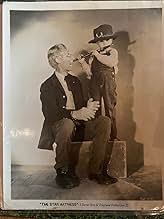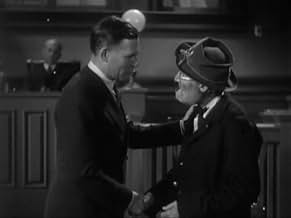Ajouter une intrigue dans votre langueMembers of a family witness two murders, but the gang uses threats, violence and kidnapping to try to keep the members from testifying.Members of a family witness two murders, but the gang uses threats, violence and kidnapping to try to keep the members from testifying.Members of a family witness two murders, but the gang uses threats, violence and kidnapping to try to keep the members from testifying.
- Réalisation
- Scénario
- Casting principal
- Nommé pour 1 Oscar
- 2 victoires et 1 nomination au total
Guy D'Ennery
- Jack Short - Henchman
- (non crédité)
Edgar Dearing
- Jim Sockett - Policeman
- (non crédité)
Mike Donlin
- Mickey - Henchman
- (non crédité)
Tom Dugan
- Deputy Brown
- (non crédité)
Robert Elliott
- Deputy Williams
- (non crédité)
Ben Hall
- Orville - Timekeeper at W.P. Randolph
- (non crédité)
George Irving
- Judge
- (non crédité)
Avis à la une
...Our the grandpa's hour.
More than the gangsters ,it's a detailed depiction of an American family circa 1930:the father,proud of his job who worries about his son who's given up high school,the mum everyone would like to have ,the daughter who forgets dinner time in her squeeze's arms,and the twins who are absolutely lovable ("Don't go to sleep first ,please!").
And there's the grandfather ,playing the Yankee doodle on his flute .Have you noticed that this tune plays the same role as Doris Day's "Que Sera Sera" in Hitchcock's "The man who knew too much" (1956)?And there's this grandpa who is finally the most courageous person of the family .So old he does not even tell you his age ,but proud of his country and resisting to the gangster's hateful blackmail.
A good film by Wellman.
More than the gangsters ,it's a detailed depiction of an American family circa 1930:the father,proud of his job who worries about his son who's given up high school,the mum everyone would like to have ,the daughter who forgets dinner time in her squeeze's arms,and the twins who are absolutely lovable ("Don't go to sleep first ,please!").
And there's the grandfather ,playing the Yankee doodle on his flute .Have you noticed that this tune plays the same role as Doris Day's "Que Sera Sera" in Hitchcock's "The man who knew too much" (1956)?And there's this grandpa who is finally the most courageous person of the family .So old he does not even tell you his age ,but proud of his country and resisting to the gangster's hateful blackmail.
A good film by Wellman.
In The Star Witness gangster chief Ralph Ince makes two big mistakes. One is that he does commit a murder. The second is that in escaping he did a brief home invasion of your average American family who are now mostly witnesses to the crime he committed. But getting them to tell their story is the subject of this film and it's what District Attorney Walter Huston has to do.
You can't get much more average than the Leeds family. Father and mother Grant Mitchell and Frances Starr, children, Sally Blane, Edward Nugent, George Ernest, and Dickie Moore. And they have their maternal grandfather Chic Sale living with them as well. He's the only one that wants to do his civic duty and hence he's Huston's Star Witness.
Sale has a really great part as the feisty old Civil War veteran and he steals every scene he's in, even from Walter Huston. He also speaks some of the more ethnocentric lines that mirror the view that The Star Witness takes about foreigners coming in to ruin this country. That was not an uncommon view of what Middle America thought of the urban gangsters who seem to come up from nowhere during those Prohibition days.
The Leeds family endures a lot, a beating to one family member and a kidnapping of another. The film earned an Oscar nomination for Best Original Screenplay. And the shootout with the gang and law enforcement is one of the best that Warner Brothers did at the time. Of course this having been directed by William Wellman who did The Public Enemy that year, you would expect the best.
You can't get much more average than the Leeds family. Father and mother Grant Mitchell and Frances Starr, children, Sally Blane, Edward Nugent, George Ernest, and Dickie Moore. And they have their maternal grandfather Chic Sale living with them as well. He's the only one that wants to do his civic duty and hence he's Huston's Star Witness.
Sale has a really great part as the feisty old Civil War veteran and he steals every scene he's in, even from Walter Huston. He also speaks some of the more ethnocentric lines that mirror the view that The Star Witness takes about foreigners coming in to ruin this country. That was not an uncommon view of what Middle America thought of the urban gangsters who seem to come up from nowhere during those Prohibition days.
The Leeds family endures a lot, a beating to one family member and a kidnapping of another. The film earned an Oscar nomination for Best Original Screenplay. And the shootout with the gang and law enforcement is one of the best that Warner Brothers did at the time. Of course this having been directed by William Wellman who did The Public Enemy that year, you would expect the best.
Smooth programmer from that gangster mecca of the 30's, Warner Bros.- First National. Chic Sale's boisterous old man steals the show as a Civil War vet who's not about to surrender to age. (Actually, Sale's still in his 40's.) The actor spreads it on pretty thick, while the rest of the cast remains surprisingly low-key for the time. As the hard-driving DA, Huston's his usual authoritative self, lending the movie a sense of needed gravity.
Except for the shootout scene, the movie's more a family drama than anything else. Witnesses to the shootout, the Leeds' family, has to decide whether to testify against the chief gangster or endanger the one young son who's being held hostage. In short, is their first duty to community or to family. The dilemma generates the movie's main suspense. My favorite scene, however, is the family dinner where the two little boys see who can out pig-stick the other as the dishes get passed around. It's a lively, well-directed bit of nonsense.
It's easy to miss what Grandpa' s (Sale) sometimes saying when he orates on the duties of being an American. His repeated references to the problems "foreigners" are making sounds rather contemporary (2015). But for Gramps, it sounds like he's blaming Italians since the gangster "Campo" is the one making problems for his family. But then in 1931, big Al Capone was making headlines as the racketeer boss of Chicago. So he may be the real reference behind Gramps' innuendo. Otherwise, the old man makes a pretty good case for putting community first.
That aside, the movie's a generally entertaining, smoothly directed artifact of the period.
Except for the shootout scene, the movie's more a family drama than anything else. Witnesses to the shootout, the Leeds' family, has to decide whether to testify against the chief gangster or endanger the one young son who's being held hostage. In short, is their first duty to community or to family. The dilemma generates the movie's main suspense. My favorite scene, however, is the family dinner where the two little boys see who can out pig-stick the other as the dishes get passed around. It's a lively, well-directed bit of nonsense.
It's easy to miss what Grandpa' s (Sale) sometimes saying when he orates on the duties of being an American. His repeated references to the problems "foreigners" are making sounds rather contemporary (2015). But for Gramps, it sounds like he's blaming Italians since the gangster "Campo" is the one making problems for his family. But then in 1931, big Al Capone was making headlines as the racketeer boss of Chicago. So he may be the real reference behind Gramps' innuendo. Otherwise, the old man makes a pretty good case for putting community first.
That aside, the movie's a generally entertaining, smoothly directed artifact of the period.
This movie directed by William Wellman is nothing elaborate or scenic, but a real good feel good picture. The typical good versus bad with pride and patriotism mixed in. Law abiding citizens are terrorized by gangsters. One family endures mobster threats, violence and kidnapping after members of the family witness a couple of murders. Walter Huston is the devoted crime fighting district attorney. But the scene stealers are young Dickie Moore and Charles 'Chic' Sale, the lovable grandpa that walks away from the old soldiers home to become the story's hero.
A family witnesses a gangster commit murder and are then threatened into keeping quiet in this fine Pre-Coder directed by William Wellman. Walter Huston plays the tough district attorney who pressures the family to testify. Huston made a lot of great movies, particularly in the early '30s. He's good in this but he's outdone by scene stealer Chic Sale as the Civil War veteran grandfather who insists upon doing his civic duty and fighting back against the criminals, no matter the cost. He's hammy but in the best way. Dickie Moore is very cute as one of the little kids. The rest of the cast is solid, including Grant Mitchell, Sally Blane, Nat Pendleton, and Ralph Ince as the gangster killer. It's a movie made in the early sound era so it's a little creaky. There's also some preachiness that seems to be off-putting to some reviewers but didn't bother me much as it's all well-intentioned and understandable, especially in the time in which it was made. It's a good movie that will please most fans of the kinds of urban crime dramas WB made so well. Go into it with the right frame of mind and I'm sure you'll enjoy it.
Le saviez-vous
- Anecdotes"Variety" reported that the film was rushed into release because of a gang shooting in Harlem in which several children were shot and the police could not get witnesses to talk. The Motion Picture Herald also reported that Warner Bros. gave the proceeds of the first two performances at The Winter Garden to the families of the children who were shot during gang warfare in Little Italy.
- GaffesTwo men are shot in the back while running away, but they clutch their chests as they fall down.
- Crédits fousIntro: "A neighborhood of plain people - - in an American city of today."
- ConnexionsVersion of The Man Who Dared (1939)
- Bandes originalesYankee Doodle
(ca. 1755) (uncredited)
Traditional music of English origin
Played often on a fife by Charles 'Chic' Sale
Meilleurs choix
Connectez-vous pour évaluer et suivre la liste de favoris afin de recevoir des recommandations personnalisées
Détails
- Date de sortie
- Pays d’origine
- Langues
- Aussi connu sous le nom de
- Star Witness
- Lieux de tournage
- Société de production
- Voir plus de crédits d'entreprise sur IMDbPro
- Durée
- 1h 8min(68 min)
- Couleur
Contribuer à cette page
Suggérer une modification ou ajouter du contenu manquant





































